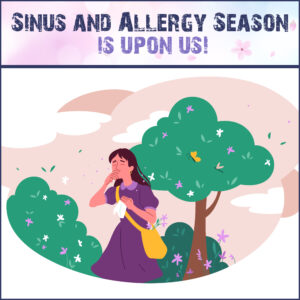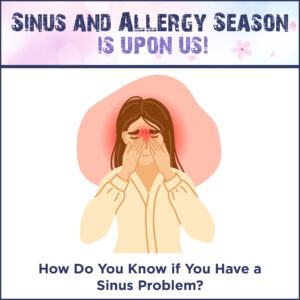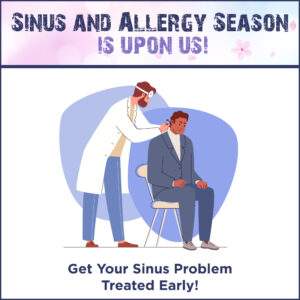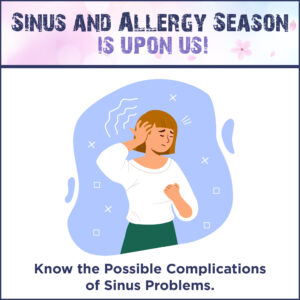It’s that time of year again. Spring is in the air, and so are all of the things that can upset or irritate our sinuses, causing the over 100 million Americans who suffer from allergy and sinus issues to experience mild to severe inflammation, congestion, pain, sore throat, cough, and a multitude of other sinus and allergy-related symptoms. Each year, sinus problems, also known as sinusitis, is the most frequently reported chronic condition in the United States.
 What is Sinusitis?
What is Sinusitis?
Sinusitis is a swelling of the inner lining of the sinuses. The sinuses are the spaces between the bones in the face where air passes and where a fluid called mucus drains into the nose. With sinusitis, the swelling blocks the openings in the sinuses through which mucus drains into the nose, creating pressure that is often painful.
 How Do You Know if You Have a Sinus Problem?
How Do You Know if You Have a Sinus Problem?
Most of us know the symptoms. Your nose runs and becomes stopped up. You feel pressure and pain in your forehead and cheeks. You may have continual postnasal drainage. You may experience plugged ears, pain in the back of the head, watery eyes and sneezing.
 What Are the Complications if the Problem Isn’t Taken Care of?
What Are the Complications if the Problem Isn’t Taken Care of?
Plugged ears can cause secondary ear infections. Nasal drainage can cause sore throats, chronic hoarseness and possible tonsillitis problems in adults as well as children. Difficulty swallowing can cause indigestion and an upset stomach.
 Why Is it Important to Treat a Sinus Problem Early?
Why Is it Important to Treat a Sinus Problem Early?
Early treatment can often prevent irreversible major problems and surgery in the future!
If you suffer from allergies, just know that you are not alone! The most common allergies include hay fever and reactions to insect bites, food and drugs. Such reactions can affect your airways, skin, digestive system, sinuses and nasal passages. Some reactions can range from mild to severe, even life-threatening.
So, if you think you may have allergy problems, don’t suffer needlessly. If over-the-counter treatments fail, try visiting your primary care provider, an allergy clinic, or consult an ear, nose and throat specialist who will take the time to locate the source of your problem.
